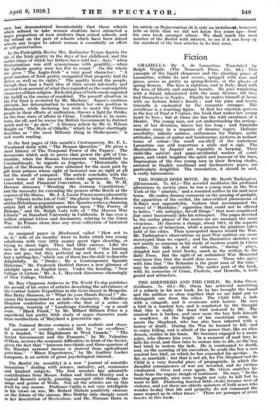THE WORLD DOES MOVE. By Mr. Booth Tarkington. (Heinemann. 7s.
ad.)—The novelist meditates the profound alterations in society since he' was a young man in the New York of the " nineties," and a resented author in his mid-west town. He makes dreamy comment on the passing of gaslight, the apparition of the cyclist, the inter-related phenomena of X-Rays and appendicitis. Guitars that accompanied the verses of " Mandalay," cigarettes that could not be offered to ladies, " old, unhappy, far-off things " that were considered fast enter humorously into his retrospect. The pages devoted to the earlier phases of the motor car are amongst the most vivacious. He discerns a change, about 1911, in the aspects and accents of behaviour, while a passion for giantism takes hold of the cities. Then syncopated dances herald the War. Mr. Tarkington's observations on post-War matters are more sterotyped than we expect ; and his illustrative sketches are not nearly so amusing as his study of modern youth in Claire Ambler. • He talks a deal of cabarets, " daring " plays, shingled hair and brief frocks, much as the writers . to the daily Press. But the sight of an unfinished War keniorial convinces him that the world does move. Those who agree with him that " the Rotarian is the great man of the time" may be similarly optimistic. The earlier part of the book, with its memories of Crane, Frederic, and Howells, is both genial and attractive.






































 Previous page
Previous page